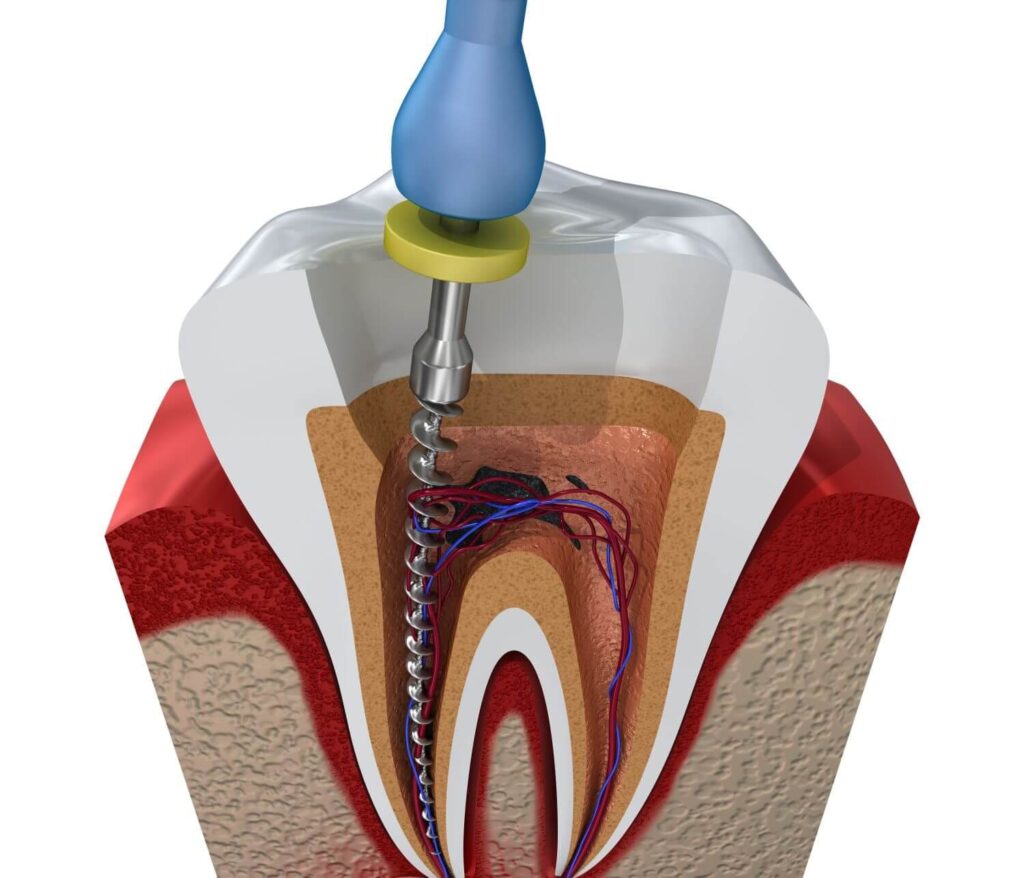If you’re considering getting a root canal treatment at your dentist in Ashburn, it’s essential to have a clear understanding of the procedure and what to expect. A root canal is a dental procedure that is typically performed when the pulp inside a tooth becomes infected or damaged due to decay, trauma, or other factors. The goal of a root canal is to save the tooth and relieve pain by removing the infected or damaged pulp and sealing the tooth to prevent further infection.
Root canal treatments are typically performed to address issues related to the dental pulp, which is the innermost part of a tooth containing nerves, blood vessels, and connective tissue. There are several common causes that can lead to the need for a root canal:
- Dental Decay (Cavities): The most common cause of root canals is dental decay, also known as cavities. When a cavity is not treated promptly, the bacteria can penetrate the tooth’s enamel and dentin layers, eventually reaching the pulp. This can lead to infection and inflammation of the pulp, resulting in severe pain and the need for a root canal.
- Dental Trauma: Physical injury to a tooth, such as a blow to the mouth or a sports-related injury, can damage the tooth and expose the pulp. If the pulp becomes infected or inflamed due to trauma, a root canal may be necessary to save the tooth.
- Cracked or Fractured Tooth: A cracked or fractured tooth can allow bacteria to enter the pulp, leading to infection and inflammation. Cracks can be caused by various factors, including teeth grinding (bruxism), chewing hard objects, or natural wear and tear over time.
- Repeated Dental Procedures: Multiple dental procedures on the same tooth, such as extensive fillings or crowns, can lead to irritation or damage to the pulp over time, necessitating a root canal.
- Deep Dental Fillings: When a dental filling is placed very deep into a tooth, close to the pulp, it can cause irritation and inflammation of the pulp. In such cases, a root canal may be required to address the issue.
- Gum Disease (Periodontal Disease): Advanced gum disease can lead to the formation of periodontal abscesses, which can extend into the tooth’s root canals, causing infection of the pulp. In some cases, root canal therapy may be needed to address this problem.
- Tooth Infections: Infections that are not treated promptly can spread to the dental pulp. These infections can result from various factors, such as untreated cavities, cracked teeth, or periodontal disease.
It’s essential to recognize the signs and symptoms that may indicate the need for a root canal, such as severe tooth pain, sensitivity to hot and cold, swelling or abscesses on the gums, and darkening or discoloration of a tooth. If you experience any of these symptoms, it’s important to see your dentist promptly for an evaluation. Early diagnosis and treatment can often help prevent the need for a root canal and save the affected tooth. If a root canal is necessary, it is a common and effective dental procedure to relieve pain and preserve your natural tooth.
Here are the general steps involved in a root canal procedure:
- Examination: Your dentist will first examine your tooth and may take X-rays to assess the extent of the damage and determine if a root canal is necessary.
- Local Anesthesia: Your dentist will administer local anesthesia to numb the area around the affected tooth. This ensures that you won’t feel pain during the procedure.
- Access Opening: Your dentist will create a small access hole in the crown of the tooth to reach the pulp chamber and root canals.
- Removal of Infected Tissue: The infected or damaged pulp tissue is carefully removed using specialized instruments.
- Cleaning and Shaping: The inside of the tooth and its root canals are cleaned and shaped to remove any remaining bacteria and debris.
- Filling: After cleaning and shaping, the tooth is filled with a biocompatible material called gutta-percha to seal the space and prevent further infection.
- Restoration: In many cases, a dental crown is placed on the tooth to provide strength and protect it from further damage. The crown is usually placed at a separate appointment.
The procedure is typically performed by a dentist who has experience with endodontics (root canal therapy). It is a common and effective treatment to save teeth that might otherwise need to be extracted.
If you have a toothache or suspect that you may need a root canal, it’s essential to consult with your Ashburn dentist. They will assess your specific situation, recommend the appropriate treatment, and provide you with all the information you need about the procedure, recovery, and potential costs. It’s always a good idea to discuss any concerns or questions you may have with your dentist to ensure that you have a clear understanding of the process and what to expect.
Dr. Rusznak at MyAshburnDentist has a remarkable history of excellence, having successfully performed thousands of root canal procedures. His extensive experience and expertise in this field make him a highly trusted choice for anyone considering a root canal.
Dr. Rusznak’s exceptional skill and dedication to patient care have resulted in countless individuals finding relief from tooth pain and preserving their natural teeth through successful root canal treatments. His commitment to delivering top-notch dental care sets him apart as a dentist you can trust.
If you’re in need of a root canal or have been referred to Dr. Rusznak, you can rest assured that you’re in the hands of a highly capable and caring professional. During your consultation, he will address any questions or concerns you may have, ensuring that you have a clear understanding of the procedure, its benefits, and the steps involved.
Dr. Rusznak’s approach prioritizes patient comfort and utilizes advanced techniques and technology to enhance the overall experience. Your peace of mind and well-being are his primary concern.
Choosing Dr. Rusznak for your root canal is not only a smart decision but also a step towards maintaining your oral health and preserving your smile. His proven success and commitment to excellence make him the ideal choice for your dental needs.


